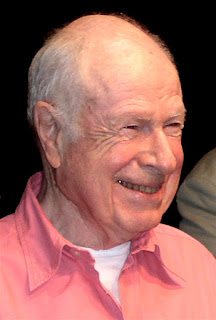Peter Brook: The director who used the world as his stage
Legendary theatre director Peter Brook, who died on Saturday (July 2) in Paris, was one of the most innovative theatre directors who used the world as his stage mounting productions ranging from challenging versions of Shakespeare through international opera to Indian epic Mahabharata.
Born in London on March 21, 1925, his father was a company director and his mother a scientist. He left school at 16 to work in film studio and then went to Oxford University from where he took a degree in English and Foreign Languages. He was a teenager when he directed his first production in London, ‘Doctor Faustus’ in 1943. Later he served as the production director at London’s famous Royal Opera House before going to begin his association with the Royal Shakespeare Company (RSC). In 1970, he shifted his base from Britain to work in Paris, where he founded the International Centre of Theatre Research.
In India, Peter Brook was best known for directing his multi-ethnic nine-hour stage adaptation of the Mahabharata in 1985. The grand French play, Le Mahabharata (The Mahabharata), was based the script by French writer Jean-Claude Carriere. It included large-scale sets and trapeze work, and it drew praise from critics. Premiering at the Avignon festival in 1985, The Mahabharata saw cast drawn from around the world, including Mallika Sarabhai as Draupadi and Ciaran Hinds as Ashwatthama. He later translated it into English in 1987, and it was staged in a quarry just outside Avignon in France. It was later made into a film in 1989, which was five hours long.
He often shunned traditional theatrical buildings for the empty space which could be transformed by light, words, improvisation and the sheer power of acting and suggestion. Brook put on plays in gymnasiums, deserted factories, quarries, schools and old gas works in towns around the world.
“I can take any empty space and call it a stage,” he wrote in his ground-breaking book ‘The Empty Space’ in 1968.
In his eventful career spanning eight decades, Brook made opera, plays, musicals, as well as film and TV productions. After decades of bringing an unorthodox approach to traditional works from the likes of Shakespeare and Puccini, he moved to Paris, where he became even more daring and experimental. His 1970 production of Shakespeare’s ‘A Midsummer Night’s Dream’, played all in white and with a huge garlanded swing, secured his place in the annals of theatre history. Peter Brook directed operas for the Metropolitan Opera in New York City and the Aix en Provence Festival. While working with Royal Shakespeare Company from 1950 through 1970, he worked on many plays by Shakespeare and was lucky in directing Paul Scofield in ‘King Lear’, Laurence Olivier and Vivien Leigh in ‘Titus Andronicus’ and John Gielgud in ‘Measure for Measure’. One of Brooks final works, at 92 years old, was ‘The Prisoner’, which he wrote and staged in Paris as well as at the Edinburgh festival and London’s National Theatre. Just this year, he staged and directed ‘The Tempest Project’ with Marie-Helane Estienne, his long-time collaborator
Brooks won many prestigious awards including Tony Award for best direction twice - in 1966 for his staging of Peter Weiss' Marat/Sade and in 1970 for the staging of Shakespeare’s ‘A Midsummer Night’s Dream’. Further, he also won an Olivier Award, an Emmy, and an International Emmy. In 2021, India had honoured him with Padma Shri.






Comments
Post a Comment